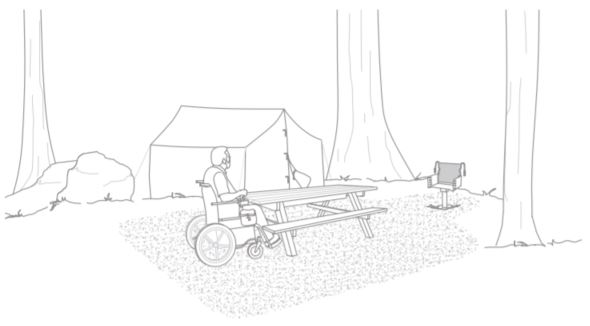Outdoor Developed Areas: A Summary of Accessibility Standards for Federal Outdoor Developed Areas
Introduction
The Access Board is responsible for developing accessibility guidelines for the construction and alteration of facilities covered by the Americans with Disabilities Act (ADA) of 1990 and the Architectural Barriers Act (ABA) of 1968. The guidelines ensure that the facilities are readily accessible to and usable by people with disabilities. The Access Board issued the current guidelines in 2004. The 2004 guidelines contain provisions for several types of recreation facilities, including boating facilities, fishing piers and platforms, golf facilities, play areas, sports facilities, and swimming pools. The Access Board amended the 2004 guidelines in 2013 by adding new provisions for trails, picnic and camping facilities, viewing areas, and beach access routes constructed or altered by Federal agencies or by non-federal entities on Federal land on behalf of a Federal agency pursuant to a concession contract, partnership agreement, or similar arrangement.

The U.S. Department of Defense, the U.S. General Services Administration, and the U.S. Postal Service have adopted the Access Board’s 2004 guidelines, including the 2013 amendments, as the enforceable standards for the ABA. The ABA Standards are comprised of two types of provisions: scoping requirements and technical requirements. The scoping requirements specify when and where elements must be accessible. The scoping requirements also specify the number of a particular type of element that must be accessible when more than one is provided. The scoping requirements are in chapter 2 of the ABA Standards and the section numbers are preceded by the capital letter “F.” The technical requirements specify the design criteria for individual elements. The technical requirements for trails, picnic and camping facilities, viewing areas, and beach access routes are in chapter 10 of the ABA Standards. The scoping and technical requirements are minimum requirements. Designers, owners, and operators are encouraged, but are not required, to exceed the minimum requirements where possible to provide increased accessibility and opportunities for people with disabilities to enjoy trails and other outdoor developed areas.
This guide is intended to help designers, owners, and operators understand and use the ABA Standards for trails, picnic and camping facilities, viewing areas, and beach access routes. Guides for other recreation facilities, including boating facilities, fishing piers and platforms, golf facilities, play areas, sports facilities, and swimming pools, are available on the Access Board’s Web site. The Access Board is also developing guides for toilet and bathing facilities, parking facilities, and other elements and spaces that are required to be accessible by the ABA Standards.
Incorporating accessibility into the design of outdoor developed areas must begin early in the planning process, with careful consideration given to the location of accessible elements and the routes that connect them. Emphasis must be placed on ensuring that people with disabilities are able to access these unique facilities and use a variety of elements that serve these facilities.
The new provisions for trails, picnic and camping facilities, viewing areas, and beach access routes are not included in the Department of Justice’s (DOJ) 2010 ADA Standards and have no legal effect on State and local governments and private entities subject to DOJ’s ADA regulations. State and local governments and private entities may, however, use the provisions for guidance when designing trails, picnic and camping facilities, viewing areas, and beach access routes. State and local governments and private entities are cautioned to check with DOJ about using the technical requirements for outdoor recreation access routes, instead of accessible routes, to connect elements at picnic and camping facilities, viewing areas, and trailheads.

User Comments/Questions
Add Comment/Question